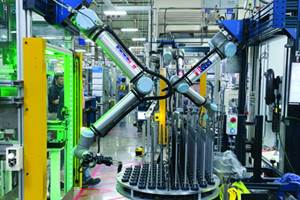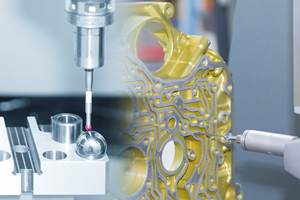How To Invest Your Accumulated Cash Profits
The pride of the American capitalist system is the successful family business. These entrepreneurs have found their way around a variety of obstacles to become “successful business owners,” or SBOs for short.
Share



ECi Software Solutions, Inc.
Featured Content
View More
.png;maxWidth=45)
DMG MORI - Cincinnati
Featured Content
View More
Hwacheon Machinery America, Inc.
Featured Content
View More
The pride of the American capitalist system is the successful family business. These entrepreneurs have found their way around a variety of obstacles to become “successful business owners,” or SBOs for short.
Many SBOs have excess funds to invest (in places other than back into the operation of their businesses). However, many SBOs have the following lament: “I know how to make money in my business. However, when it comes to making money with excess funds to invest, either I don’t have the time to watch it, don’t know how to watch it, or rely on my investment advisor. When the market is up, my advisors do fine; when it’s down, they do lousy. What should I do?”
Regular readers of this column know the author is a tax planner who finds legal ways to avoid all types of taxes—particularly estate taxes. Doing this requires, among other things, getting my client’s personal balance sheet.
One thing balance sheets reveal about the investments of SBOs is that their success or failure in the stock market and other investments generally mirrors the Dow Jones—happy on the way up and painful on the way down.
Now what about that excess cash? The SBOs have had terrible investment results. The investments are almost always conservative and are divided among CDs and money market funds, municipal bonds and varieties of annuities.
After taxes and inflation, net earnings on investments in CDs and money market funds are typically less than 3 percent and are sometimes even negative. Income-tax-free bonds not only have a low rate of return, but they also fall in value when interest rates rise. As far as annuities go, I have never had a client tell me that he or she is happy with the results of an annuity. I would like to hear from any reader who has personally had a positive experience with any annuity.
As you can imagine, almost every estate-planning consultation with an SBO requires serious consideration of the client’s investments. This includes an examination of the investment safety, risk, tax consequences, rate of return and other factors. We must also discuss alternate investments to determine their profitability, risk and how they are taxed, among other things.
Currently, the most popular alternative investments are senior settlements (SS), also called “life settlements.” The following quotes from The Wall Street Journal and USA Today explains why SS plans are becoming such a popular investment.
“Life settlements (has become a) trillion dollar industry. . .dominated by institutional investors including Berkshire Hathaway (billionaire Warren Buffet’s company), AIG and CNA. Their pursuit of this market is related to the degree of safety, high yields in excess of 15 percent per year and the fact that a life settlement is not affected by market forces.
“Life settlements are a very good option for the investor that has, as his or her investment philosophy, a desire for a secure, safe and ‘no risk’ investment...It is for your ‘nest egg’ money...It is not considered a security by the SEC. Therefore, it is not normally provided as an investment option by stock brokers.”
You may be wondering if the “little guy” (as opposed to an institutional investor) can invest in SS. The answer is “Yes.” It’s all made possible by a small, publicly traded (NASDAQ) company. It has had an average rate of return of 16.28 percent per year during the company’s 14-year operating history.
If you want to make a killing on your investments, then SS plans are not for you. However, if a rate of return of 16 percent or more with no market risk is of interest to you, then fax me your name, address, phone numbers (business, home and cell) and estimated amount to invest at 847-674-5299. Note that there is a minimum investment of $50,000 for accredited investors.
Related Content
4 Steps to a Cobot Culture: How Thyssenkrupp Bilstein Has Answered Staffing Shortages With Economical Automation
Safe, economical automation using collaborative robots can transform a manufacturing facility and overcome staffing shortfalls, but it takes additional investment and a systemized approach to automation in order to realize this change.
Read MoreRethink Quality Control to Increase Productivity, Decrease Scrap
Verifying parts is essential to documenting quality, and there are a few best practices that can make the quality control process more efficient.
Read MoreWhat are Harmonics in Milling?
Milling-force harmonics always exist. Understanding the source of milling harmonics and their relationship to vibration can help improve parameter selection.
Read More6 Variations That Kill Productivity
The act of qualifying CNC programs is largely related to eliminating variations, which can be a daunting task when you consider how many things can change from one time a job is run to the next.
Read MoreRead Next
5 Rules of Thumb for Buying CNC Machine Tools
Use these tips to carefully plan your machine tool purchases and to avoid regretting your decision later.
Read MoreRegistration Now Open for the Precision Machining Technology Show (PMTS) 2025
The precision machining industry’s premier event returns to Cleveland, OH, April 1-3.
Read MoreBuilding Out a Foundation for Student Machinists
Autodesk and Haas have teamed up to produce an introductory course for students that covers the basics of CAD, CAM and CNC while providing them with a portfolio part.
Read More






















.png;maxWidth=150)






.jpg;maxWidth=300;quality=90)
















